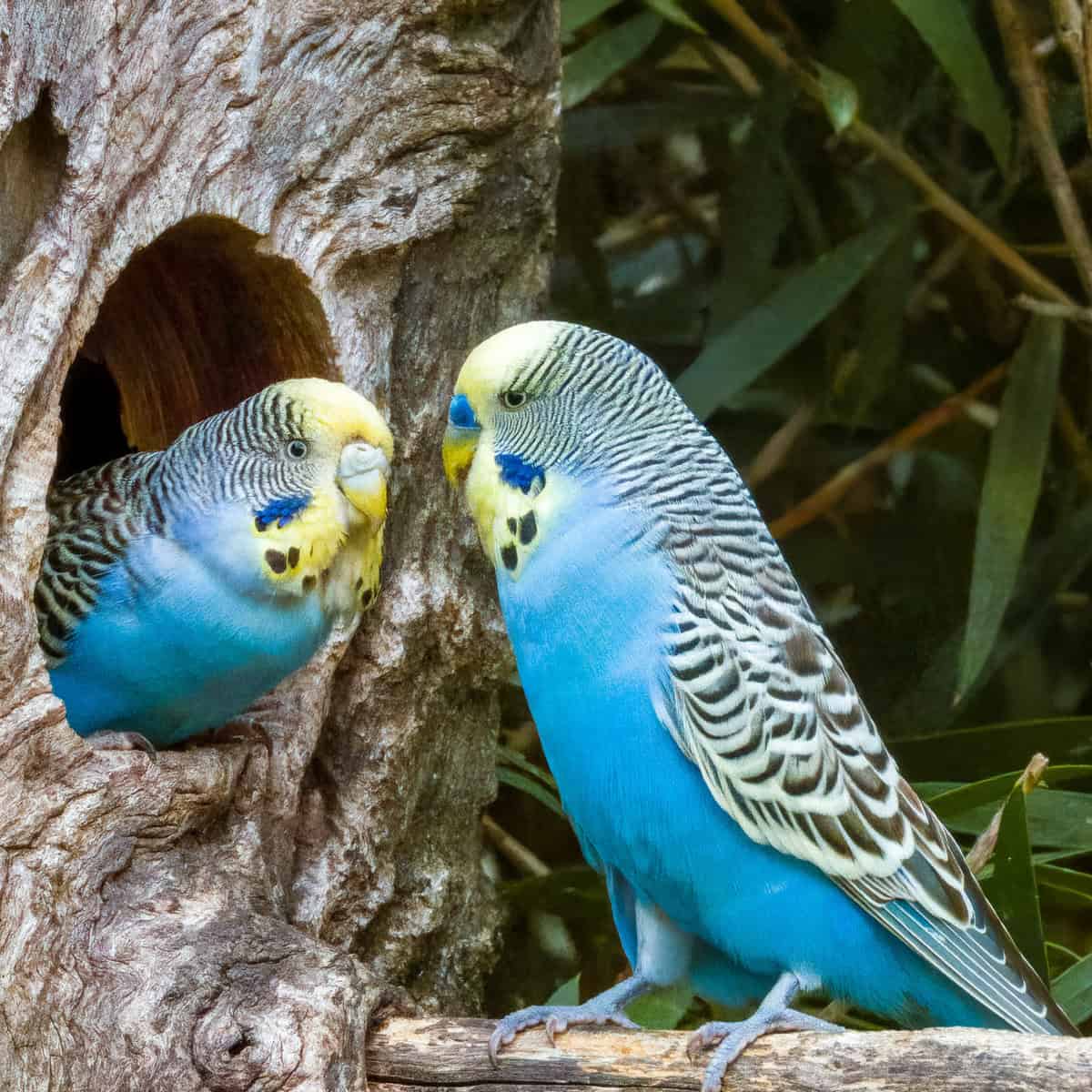Last Updated on by Catherine Tobsing
Budgies, also known as parakeets, are one of the most popular pet birds worldwide.
Their small size, vibrant colors, and cheerful personalities make them a favorite choice for bird enthusiasts and first-time bird owners alike.
This comprehensive guide will help you understand everything you need to know about caring for your budgie to ensure it lives a happy and healthy life.
Understanding Budgies
Budgies are native to Australia and are part of the parrot family. They are highly social birds that thrive on interaction, whether with their human companions or other budgies. Their playful and curious nature requires mental stimulation and a nurturing environment.
Budgies have a wide range of color mutations, including green, blue, yellow, and white. Their natural habitat consists of open woodlands and grasslands, where they live in flocks and communicate through chirping and mimicry. Understanding their natural behavior helps provide an enriching environment for them in captivity.
Key Traits of Budgies:
- Average lifespan: 7-15 years
- Size: 7 inches in length
- Common colors: Green and yellow (wild type), but selective breeding has produced blues, whites, and other variations.
- Vocal abilities: Budgies can mimic human speech and are known for their chirpy communication.
Housing Your Budgie
Providing a safe and comfortable environment is essential for your budgie’s well-being.
Cage Requirements:
- Size: At least 18x18x18 inches for one budgie. Bigger is always better, especially if you have more than one bird.
- Bar spacing: No wider than 1/2 inch to prevent escape or injury.
- Accessories: Include perches of varying diameters, swings, ladders, and chew toys for enrichment.
Location Tips:
- Place the cage in a well-lit area but away from direct sunlight and drafts.
- Avoid kitchens due to potential toxic fumes from non-stick cookware.
Setting Up a Comfortable Cage
- Size: A spacious cage is essential. The minimum size should be 18” x 18” x 24”, but bigger is always better. Horizontal space is especially important since budgies are active fliers.
- Placement: Keep the cage in a draft-free area with good lighting but away from direct sunlight. Avoid placing the cage near the kitchen or areas with strong odors or fumes, as these can be harmful to your budgie.
- Accessories: Provide perches of varying diameters to promote healthy feet. Use natural wood perches alongside standard ones. Add toys like bells, mirrors, and ladders to encourage activity. A shallow dish or birdbath should be included for bathing, as cleanliness is vital for their feathers and overall health.
Feeding Your Budgie
A balanced diet is crucial for your budgie’s health.
Diet Essentials:
- Pellets: These should make up the majority of their diet as they provide balanced nutrition.
- Seeds: Offer as a treat; they are high in fat and should not be the main food source.
- Fresh Foods: Fruits and vegetables like carrots, apples, spinach, and broccoli. Always wash thoroughly and remove uneaten portions promptly.
- Avoid: Chocolate, avocado, caffeine, and any salty or sugary foods.
Fresh Water:
- Replace daily and clean the water dish regularly to prevent bacterial growth.
Budgie Health and Maintenance
Keeping your budgie healthy involves regular monitoring and proactive care.
Signs of a Healthy Budgie:
- Bright eyes and clean nostrils
- Smooth, glossy feathers
- Active and alert behavior
- Regular eating and droppings
Common Health Issues:
- Respiratory problems: Watch for wheezing or tail bobbing.
- Overgrown beak or nails: Provide natural wood perches and regular checkups.
- Obesity: Prevent by offering a varied diet and encouraging activity.
Veterinary Care: Schedule annual checkups with an avian vet and seek immediate care if you notice any signs of illness.
What budgies do when you’re not watching – Video
Socializing and Enrichment
Budgies are highly social and intelligent birds that need daily interaction and mental stimulation.
- Spend at least an hour daily talking to, playing with, or simply sitting near your budgie. They enjoy hearing your voice and will often respond with chirps.
- Hand-taming your bird budgie can help build trust and strengthen your bond. Start by offering treats through the cage bars and progress to allowing them to step onto your finger.
- Consider getting a companion budgie if you’re unable to dedicate several hours a day to interaction. However, introduce new birds slowly to avoid territorial conflicts.
Tips for Socializing:
- Spend time talking, whistling, or playing with your budgie every day.
- Consider getting a companion budgie if you’re often away from home.
Enrichment Ideas:
- Provide toys that encourage foraging and problem-solving.
- Rotate toys regularly to keep them interesting.
- Allow supervised out-of-cage time in a bird-safe room.
- Foraging Toys: Hide treats in puzzle toys or paper rolls to engage their natural foraging instincts.
- Playtime: Budgies love interacting with their owners. Provide soft music, bird-safe videos, or interactive games to keep them entertained.
- Natural Elements: Introduce safe natural branches from untreated trees for climbing and chewing. This also helps keep their beaks healthy.
- Rotate Toys: Swap out toys regularly to prevent boredom. Budgies enjoy exploring new textures and shapes.
Training Your Budgie
Budgies are intelligent and can learn tricks and mimic sounds. Training also strengthens the bond between you and your bird.
- Start with basic commands like “step up,” teaching them to step onto your finger or perch.
- Use positive reinforcement, like treats or gentle praise, to encourage good behavior. Be patient and consistent, as training can take time.
- Gradually introduce more complex tricks, such as teaching them to retrieve small objects or mimic simple words and phrases. Keep training sessions short and fun.
Health and Wellness
- Signs of a Healthy Budgie: Bright eyes, smooth feathers, an active demeanor, and a steady appetite are good indicators of health. Watch for any changes in behavior or appearance.
- Common Health Issues: Respiratory problems, feather plucking, obesity, and parasitic infections are common ailments. Prevent these by maintaining a clean cage, a balanced diet, and regular vet checkups.
- Exercise: Allow your budgie out-of-cage time daily in a safe, bird-proofed area. Provide climbing structures and encourage flight to keep them physically fit.
- Veterinary Care: Schedule annual checkups with an avian veterinarian. Early detection of health issues can save your budgie’s life.
Breeding Budgies
If you’re considering breeding budgies, ensure you’re prepared for the responsibility.
What You Need to Know:
- Breeding pair: Ensure both birds are healthy and at least 1 year old.
- Nest box: Provide a secure and comfortable space for laying eggs.
- Diet: Boost with calcium-rich foods like cuttlebone and egg yolks.
Conclusion
Caring for a budgie can be a rewarding experience, filled with joy and companionship. By providing proper care, nutrition, and enrichment, you can ensure your feathered friend leads a vibrant and fulfilling life. Whether you’re a seasoned bird owner or a first-time budgie parent, these tips will help you create the perfect environment for your pet.
Caring for a bird budgie is a long-term responsibility. Ensure you have the time, resources, and dedication to meet their needs throughout their life.
Budgies thrive on routine and consistency. Be prepared to adjust your schedule to accommodate their care, from daily feeding and cleaning to regular vet visits. Consider making arrangements for their care in case of travel or emergencies.
A well-cared-for bird budgie can bring years of joy and companionship. By providing a safe environment, proper nutrition, and plenty of love, your budgie will thrive and brighten your life with their charm and antics. Take the time to learn about their needs, and you’ll be rewarded with a happy and healthy feathered friend.
Written by Mitch Rezman and the Windy City Parrot Content Team
Author Profile
Latest entries
 Feeding Exotic BirdsDecember 29, 2025How to Switch or Convert Your Bird From Seeds to Pellets: Real-Life Case Studies and Practical Guidance
Feeding Exotic BirdsDecember 29, 2025How to Switch or Convert Your Bird From Seeds to Pellets: Real-Life Case Studies and Practical Guidance Feeding Exotic BirdsDecember 16, 2025A Practical, Budget-Smart Guide to Feeding Birds Well
Feeding Exotic BirdsDecember 16, 2025A Practical, Budget-Smart Guide to Feeding Birds Well Bird EnviornmentsDecember 7, 2025Understanding Budgie Cage Bar Orientation: Myths, Realities & Practical Solutions for Vertical-Bar Bird Cages
Bird EnviornmentsDecember 7, 2025Understanding Budgie Cage Bar Orientation: Myths, Realities & Practical Solutions for Vertical-Bar Bird Cages Feeding Exotic BirdsDecember 5, 2025How Dr. T.J. Lafeber Rewrote the Future of Pet Bird Nutrition
Feeding Exotic BirdsDecember 5, 2025How Dr. T.J. Lafeber Rewrote the Future of Pet Bird Nutrition



